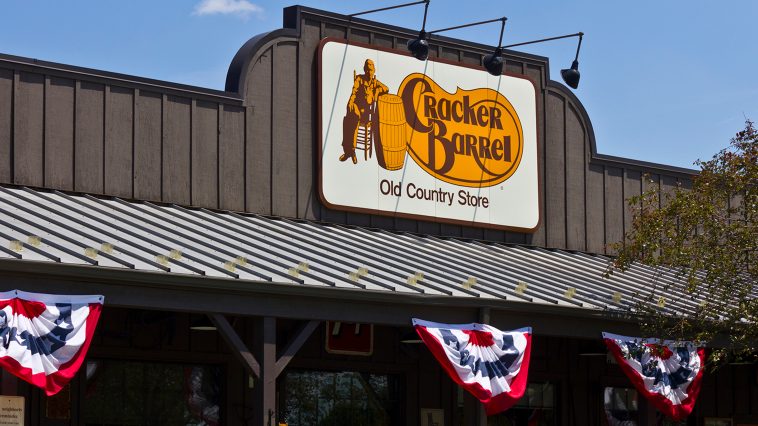LISTEN HERE
Cracker Barrel, a popular American chain restaurant, has announced its decision to close its final eateries in the Portland, Oregon, area. The announcement follows Walmart’s decision to leave the area, with the CEO citing concerns over crime and theft.
Cracker Barrel, which operates over 600 locations nationwide, attributed its decision to the impact of the COVID-19 pandemic on its business.
Joes economy..
Cracker Barrel becomes latest company to flee Portland amid rising crime, retail theft
Walmart announced earlier this month it is closing all of its Portland, Oregon, locations— Wisdom (@JJr18576490) March 27, 2023
In a statement, the company stated that it continually evaluates the performance of its stores, using various criteria to ensure that it meets the needs of its guests and its business. Unfortunately, the pandemic’s impact on its business in the Portland area was too great to overcome, leading to the decision to close its Beaverton, Tualatin, and Bend locations on March 20.
The company acknowledged that the decision to close a store is never an easy one, and it expressed sadness at having to take this step. Its focus is currently on assisting its impacted employees during this transition.
The closure of these Cracker Barrel locations, along with Walmart’s departure, will have a significant impact on the local economy, as it represents a loss of jobs and revenue for the region.
Democrat policies are destroying America, one Cracker Barrel at a time. #DemocratsHateAmerica pic.twitter.com/dfLKNXrPtd
— Tony Morocco (@AJMorocco) March 26, 2023
The news has also raised concerns about the broader economic implications of lockdowns and their impact on the retail and hospitality industries. Walmart cited an overbearing shoplifting wave in Portland as the reason for their leaving. Along with Cracker Barrel, Walmarts final locations in Portland will be closed down.
Many sources attempt to claim that Walmarts evacuation of Portland is one brought about by the pandemic… However this is obviously not the case according to Walmarts on statements in relation to the matter.
Walmart’s recent decision to close all of its stores in the Portland, Oregon, area comes on the heels of warnings from its CEO, Doug McMillon, about the impact of retail crime on the company’s bottom line.
It’s already happening in Portland Walmart closing 2 major locations due to looting and violence https://t.co/533bDnJebA
— kelly gallagher (@kellygallaghe13) March 27, 2023
As reported in December by CNBC, McMillon expressed concerns about the high levels of theft in Walmart stores across the country, and specifically in Portland, where the problem is particularly acute.
McMillon noted that theft has been a longstanding issue for Walmart, but that the problem has grown worse in recent years, with prices becoming higher and stores at risk of closure if authorities do not take action to combat retail crime.
While Walmart has implemented measures to reduce theft, such as increasing security and investing in technology, McMillon stressed the need for a coordinated effort from law enforcement and policymakers to address the root causes of the problem.
The closure of Walmart’s Portland stores is a stark reminder of the challenges facing retailers in an environment of increasing economic uncertainty and rising crime rates. The impact of retail crime extends beyond the loss of revenue for businesses; it also affects the safety and well-being of employees and customers, and contributes to broader social and economic problems.
Isn't Walmart closing down its Portland stores?
— get off my lawn (@jesse2gunz) March 26, 2023
To address these challenges, it is important for policymakers, law enforcement officials, and industry leaders to work together to develop comprehensive strategies to combat retail crime and promote a safe and prosperous retail environment.
This may involve implementing measures to deter theft, such as increased security and improved training for employees, as well as investing in technology and developing policies that address the root causes of crime.
The city of Portland, Oregon, has been grappling with a growing problem of crime and homelessness over the past several years, with serious implications for local businesses and the broader community.
According to a report by the Daily Mail, over 2,600 downtown businesses have filed a change of address with the U.S. Postal Service, indicating a significant exodus of businesses from the area.
Walmart to shutter Portland locations just months after CEO’s warnings on crime a:1:{i:0;s:0:"";} #FoxBusiness
— dale Wilhite (@daleWilhite3) March 26, 2023
The impact of this trend on the local economy cannot be overstated. The loss of businesses represents a significant loss of revenue and jobs, and contributes to a broader sense of social and economic dislocation in the community.
In addition, the exodus of businesses from downtown Portland has raised concerns about the city’s long-term viability as a commercial hub and a desirable place to live and work.
The closure of the Nike store in northeast Portland in November 2020 is just one example of the challenges facing businesses in the city. The store closed abruptly after a string of brazen shoplifting incidents, highlighting the ways in which crime and lawlessness are impacting local businesses. The closure of the store not only represented a loss of revenue for Nike, but also contributed to a sense of insecurity and uncertainty in the surrounding community.
Cracker Barrel becomes latest company to flee Portland amid rising crime, retail theft a:1:{i:0;s:0:"";} #FoxBusiness
— Dmac (@dtmcgraw2) March 27, 2023
People don’t know how good they have it. None of them would move to Portland or San Francisco though. The homelessness, crime and people urinating on their doorsteps would be a real wake up call. They benefit from GOOD policies but have been conditioned to hate republicans,… https://t.co/lNDIlwXQiJ
— IreneBritUSA (@irenebritusa) March 27, 2023
https://twitter.com/Jpoke5372Sk/status/1640159090272772097?s=20


